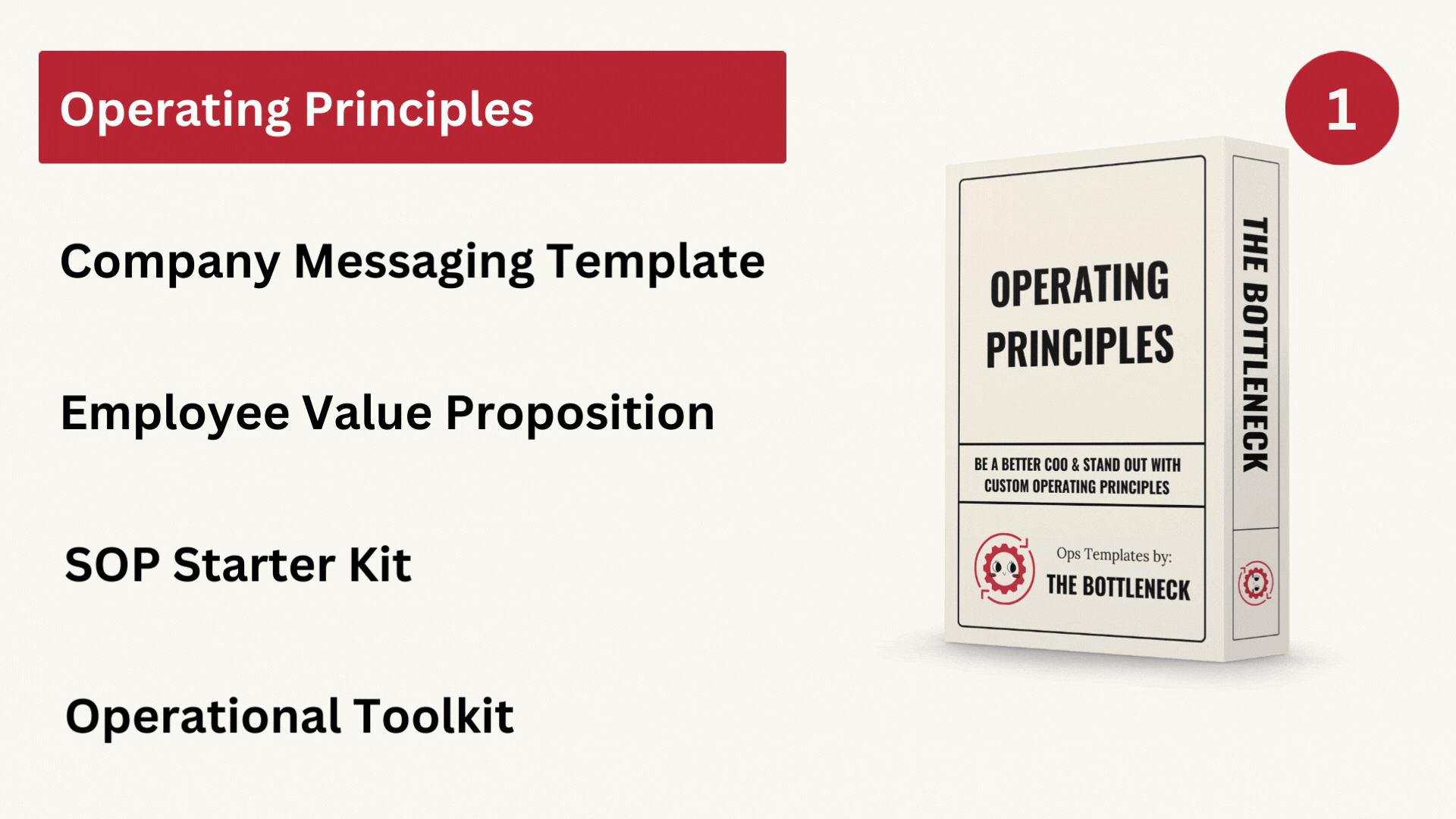
Read Time: 10.6 Minutes
Hi Operators ⚙️
Sippin on suds in Tokyo has a guy dreamin of the good life. One week left before I'm back in the States.
You know who is waiting for me? My team.
People management isn't easy. Not everyone takes to it naturally, but that doesn’t mean you can’t improve. But here's how I make it a breeze.
⚙️ Here’s what we got going on today:
The TRM delegation framework → How to use TRM to increase your team’s output
Stop “teaming,” lead instead → Getting your hands dirty isn’t always the best approach
Let’s talk about deadlines → Stop stressing your team out, and start having better conversations about deadlines
Let’s jump in.
(P.S Have questions about scaling your business? Reply to this email or email me at [email protected] and I’ll answer them in the next edition)

Together With Attio
A CRM for the next era of companies.

There’s a world where your CRM is powerful, easily configured, and deeply intuitive. Attio makes that a reality.
Attio is a radically new CRM built specifically for the new era of companies. It’s flexible, easily configures to your unique data structures, and works for any go-to-market motion from self-serve to sales-led.
Attio automatically enriches your contacts, syncs your emails and calendar, gives you powerful reports, and lets you quickly build Zapier-style automations.
The next era of companies deserves more than a one-size-fits-all CRM with outdated UX.
Join Modal, Replicate, ElevenLabs and more.
Together with Koop Technologies
Protect your company with preventive business insurance

Koop provides general liability, tech errors & omissions, cyber liability, and management liability insurance - all powered by risk prevention controls 🚀
Koop has helped tech companies in 60+ use cases to get comprehensive insurance coverage, ensure contractual compliance with customer and investor requirements, and reduce enterprise risk.

Operators Library
Some opening resources on management, leadership, and team-building.
Looking to build out your team? Save 70% on employee costs with the top 1% off-shore talent to scale your business.*
Leadership lessons from Navy Commander Michael Abrashoff, the man who turned one of the worst-performing ships in the US Navy into the highest-performing vessel in the entire fleet.
An interview with Carole Robin - former professor at Stanford Graduate School of Business and founder of “Leaders in Tech” - about frameworks for building strong relationships and leading teams. Every people-manager should listen to this one.
How one of the most sought-after executive coaches in Silicon Valley teaches his clients to approach 1:1 meetings.
Make sure that you provide clear, consistent feedback to your team, or you risk dropping a “synthesis bomb” on the people you manage.
P.S. To get featured in this section, share the newsletter 10 times using this referral link, and I'll include you in a future issue.

I. A Simple Framework For Better Delegation
Insight from Hotsinger
Don’t delegate in the dark.
One tool we can use: “Task Relevant Maturity” (or “TRM”).
We can think of it as a spectrum.
On the high end, we have highly skilled individuals with a high level of agency. They’re proficient at their jobs and tend to will their way through any blockers.
On the low end of the scale, we have lower-skilled (often more junior) individuals who may lack confidence in executing without support.

Understanding where your reports fall on this scale isn’t an exact science, but the best way to determine their relative TRM is through frequent and honest 1:1’s (a topic we’ve already covered).
In those meetings, gauge how well your report can define the "why" behind their job.
How well can they explain the reason for the task you're delegating to them?
How well can they (on their own) formulate and explain a detailed plan to get from zero to the desired outcome?
If they can do both, odds are that they're fairly high-TRM.
For high-TRM individuals:
You can trust them with more important/urgent tasks.
You can define a desired outcome rather than a process to follow.
You can afford to check in on task status less, and instead monitor results.
For lower-TRM individuals:
You should not delegate high-importance tasks.
You will often need to clearly define a step-by-step process for them to follow.
You will need more frequent check-ins on project status.
Over time, your team's TRM will increase. They'll get better at their jobs, they'll have more context around the bigger picture, and you can delegate more effectively without work.
Learn More: How Andy Groves defines TRM

II. Stop “Teaming,” Lead Instead
Insight from Joshua Schultz
We all want to be a manager that our team respects.
New managers often think that the way to earn that respect is by being the one that is willing to hop in and get hands dirty whenever.
You delegate a task to your favorite direct report, and things are moving slowly or hitting roadblocks.
The instinct is to take the reins and contribute directly.
You open Excel and build a large portion of the model. You spend an hour or two adding to the deck.
Don't get me wrong, we all have to help push.
But "teaming" vs. leading has its downsides.

It misaligns expectations around who really owns what tasks.
It confuses responsibilities and gives the dangerous impression that, if someone doesn't handle a task to completion, someone else will pick up the slack.
It consumes time that could be better spent on the higher-level tasks that you're actually responsible for in a manager role.
The real mark of an effective manager is the ability to scale output across a team and organization. They build and optimize systems that get the best out of their people.
With that goal in mind, "teaming" is entirely counterproductive.
In reality, the most effective way to earn your team's respect is by empowering them to take ownership over their tasks rather than taking work out of their hands.
It may seem like you're "taking one for the team," but you're actually avoiding the more challenging but important work of leading your team.
Next time you get the urge to jump in and take over a task, try leading instead.
Learn More: Take some steps to get out of the weeds

III. Let’s Talk About Deadlines
Insight from Wes Kao
Like all stress-inducers, deadlines are an entirely human construct.
They don't exist outside of our brains, inboxes, or calendars.
Despite this fact, teams often have trouble communicating about deadlines effectively.
Many conversations between managers and direct reports are rooted in anxiety, frustration, or both.

It doesn't have to be this way.
Deadlines are set with imperfect information by managers who, if they're doing their job right and leading rather than "teaming," will have less direct knowledge of how long a series of tasks takes.
So, what is the solution? How do we, as managers, take the anxiety out of these conversations while maintaining accountability?
The answer is pretty simple: good managers will empower their reports to flag any concerns around a deadline as soon they arise.
The earlier any concerns come to light, the easier they are to manage and mitigate.
What often prevents these conversations from happening until they're too late is the initial anxiety of broaching the topic. It's on the manager to encourage and reward instances in which these concerns are communicated.
And, when these conversations do happen, it can lead to some positive outcomes:
You're able to identify and fix an inefficiency somewhere in the workflow. For example, someone is performing a spreadsheet task manually when they could be using a formula or macro that you share.
You reprioritize or reassign work so that the deadline can still be met, and both you and your team are better off.
In cases where meeting the deadline truly is unrealistic, you can adjust expectations early and avoid a situation where other stakeholders receive late notice.
There is no downside to clear communication, especially around something as touchy and potentially stressful as work deadlines.

Something Fun
One approach to keeping an eye on your team’s productivity…

Last Word 👋
How am I doing?
I love hearing from readers, and I’m always looking for feedback.
How am I doing with The Bottleneck? Is there anything you’d like to see more or less of? Which aspects of the newsletter do you enjoy the most?
Hit reply and say hello - I’d love to hear from you!
Cheers,
Rameel from The Bottleneck team
Spread The Word
Share The Bottleneck with friends to get a few freebies. Maybe you’ll make some new ones on the way 😆
We’ll give you free stuff and more friends if you share a link. Only one link.

{{rp_personalized_text}}
